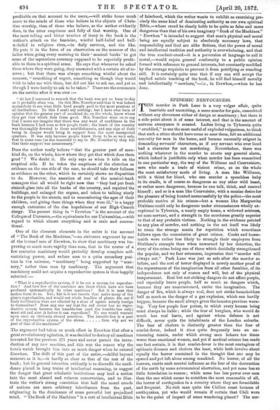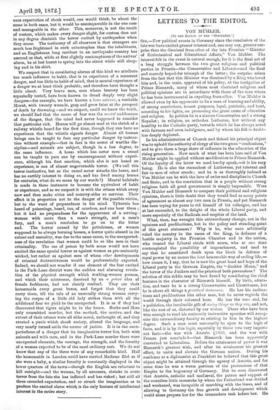EPIDEMIC NERVOUSNESS.
THIS murder in Park Lane is a very vulgar affair, quite inartistic and unexciting, a mere murder for gain, committed without any cleverness either of design or machinery ; but there is
a side-point about it of some interest, and that is the amount of nervous annoyance it created. Ladies living in Tyburnia quite " cruddled," to use the most useful of exploded vulgarisms, to think that such a crime should have come so near them, felt an additional necessity for men in the house, and became unusually exigent in demanding servants' characters, as if any servant who ever lived had a character for not murdering. Nevertheless, there was nothing whatever in the murder to create any general alarm, which indeed is justifiable only when murder has been committed in one particular way, the way of the Williams and Courvoisiers, men who made a trade of violent crime, as on the whole the most satisfactory mode of living. A than like Williams, with a thirst for blood, who can murder a speechless baby in its cradle, is of course as dangerous as any other wild beast, or rather more dangerous, because he can talk, think, and control himself ; and so is a man like Courvoisier, with a maniac desire for the pleasure of being hunted unsuccessfully by the police—the most probable motive of his crimes—but a woman like Marguerite Dixblanc could only be dangerous under circumstances wholly ex- ceptional in Tyburnia, a nearly empty house, a widowed mistress, no man-servant, and a strength in the murderess greatly superior to that of any probable victims. Nothing in the evidence pointed to any plan of murder, and nothing in the act itself was likely to rouse the strange mania for repetition which sometimes follows upon the commission of great crimes. Cooks and house- maids were rather less likely to strangle their employers from Dixblanc's example than when unwarned by her detection, the story of the crime being one of those which decidedly strengthened the popular, and we fear erroneous, impression that " murder will always out." Park Lane was just as safe after the murder as before, and the sort of terror displayed is merely another proof of the separateness of the imagination from all other faculties, of its independence not only of reason and will, but of the physical temperament. Real but not striking dangers do not affect people, and especially brave people, half so much as dangers which, because they are unaccustomed, excite the imagination. The danger of fire, which is always real, does not strike householders half as much as the danger of a gas explosion, which can hardly happen, because the smell always gives the inmates previous warn- ing. Very few people fear poison, to which every human being must always be liable ; while the fear of burglars, who would do much lees real harm, and against whom defence is not difficult, never quits the inhabitants of the London suburbs. The fear of cholera is distinctly greater than the fear of scarlet-fever, indeed it rises quite frequently into an un- reasoning mania, under which strong men behave ten times worse than emotional women, and yet if medical science has made one fact certain, it is that scarlet-fever is the most contagious of epidemic diseases and cholera the least, while both involve about equally the horror contained in the thought that one may be spared and yet left alone among mankind. No horror, of all the horrors, exerts such mental influence as the fear of the destruction of the earth by some astronomical aberration, and yet none has so little foundation in reason ; while none has less power over men than the one which seems to outsiders the most reasonable of all, the horror of earthquakes in a country where they are formidable and frequent. No rich man quits the Chilian coast because of earthquakes, yet who would remain if certain that Chili were to be the point of impact of some wandering planet? The ner- vous expectation of shock would, one would think, be about the same in both cases, but it would be unconquerable in the one case and manageable in the other. This, moreover, is not the result of custom, which makes every danger slight, for custom does not in any degree diminish the terror excited by earthquakes when they occur. The testimony of all observers is that strangers are much less frightened in such catastrophes than the inhabitants, and an Englishman long resident in an earthquake country has assured us that, while at first slightly contemptuous of the natives' alarm, he at last learnt to spring into the street while still sleep- ing and in his shirt.
We suspect that in considering alarms of this kind we attribute too much influence to habit, that is to experience of a recurrent danger, and too little to habit of mind, that is mental experience of a danger we at least think probable, and therefore have thought a little about. Very brave men, men whose bravery has been repeatedly tested, have been known to dread deeply very slight dangers—for example, we have known a bean sabreur, a veritable Murat, with twenty wounds, gasp and grow faint at the prospect of death by drowning—and we suspect, could we know the truth, we should find that the cause of fear was the mental suddenness of the danger, that the mind had never happened to consider that particular risk. Horses will go almost mad at the shriek of a railway whistle heard for the first time, though they can have no experience that the whistle signals danger. Almost all human beings can be taught to face any particular danger by instruc- tion without example—that in fact is the secret of warlike dis- cipline—and animals are subject, though in a less degree, to the same influence. A horse which has never seen a camel can be taught to pass one by encouragement without experi- ence, although his first emotion, which also is not based on experience, is one of almost ungovernable terror. (We call this terror instinctive, but as the camel never attacks the horse, and has no earthly interest in doing so, and has lived among horses for centuries, what do we mean by our words ?) Mental habitude is made in these instances to become the equivalent of habit or experience, and so we suspect it is with the crimes which every now and then make cities and country-sides so nervous. Their effect is in proportion not to the danger of the possible victim, but to the want of preparedness in his mind. Tyburnia has heard of poisonings, heard, too, of murders, and can bear them ; but it had no preparedness for the appearance of a serving- woman with more than a man's strength, and a man's fury, and a man's resolution to go on to the bitter end. The horror caused by the petroleuses, or women supposed to be always burning houses, a horror quite absurd in its extent and unreality, was due to the same cause, to the unexpected- ness of the revelation that women could be so like men in their criminality. The use of poison by both sexes would not have excited the same special horror as against women as pre-eminently wicked, but rather as against men of whom other developments of criminal destructiveness would be preferentially expected. Indeed, we should not wonder if one element of the fear excited in the Park-Lane district were the sudden and alarming revela- tion of the physical strength which working-women possess, and which their mistresses, deceived by an a priori idea of female feebleness, had not clearly realized. They see their housemaids carry great boxes, and forget that they could carry them, till the tale of an unusually strong woman carry- ing the corpse of a little old lady strikes them with all the additional fear we yield to the unexpected. It is as if they had discovered that tigers might be in the house. Burke and Hare only committed murder, but the method, the motive, and the extent of their crimes were all alike novel, unthought of, and they created a panic which shook society, altered the language, and very nearly turned aside the course of justice. It is in the unex- pectedness of a danger that its imaginative terror lies, both with animals and with men, and in the Park-Lane murder there were unexpected elements, the courage, the strength, and the ferocity of a woman expected to be of the most ordinary sort. We do not know that any of the three were of any remarkable kind. Half the housemaids in London could have carried Madame Riel as if she were a baby, a similar ferocity is constantly displayed in the lower quarters of the town—though the English are reluctant to kill outright—and the woman, by all accounts, shrinks in acute terror from the fate she has inflicted and has risked ; but still all three exceeded expectation, and so struck the imagination as to produce the excited alarm which; is the only feature of intellectual interest in the entire story.



































 Previous page
Previous page